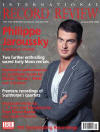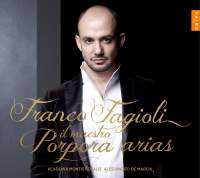Texte paru dans: / Appeared in: |
|
|
Outil de traduction (Très approximatif) |
|
|
Reviewer: Christopher
Price Before this disc arrived, I had not heard the Argentinian countertenor Franco Fagioli, although I had read some rapturous acclaim for his debut disc, 'Arias for Caffarelli' (it was reviewed in IRR in November 2013). My anticipation was heightened by the quality of his accompanying ensemble, well known to me, the period‑instrurnent Accademia Montis Regalis under its current harpsichordist director, Alessandro De Marchi. Moreover, a collection of arias by Nicola Porpora (16861768), one of the masters of opera seria in its heyday, who was also a great singing teacher, promised much. Imagine my surprise when I started playing the disc. It is a commonplace that the countertenor voice cannot achieve the tone or range of a true castrato singer and, for this reason, today women commonly sing the castrato parts, Rather than try to approximate, no matter how inaccurately, the castrato sound, Fagioli seems to want to imitate a modern operatic prima donna. I understand now why some critics have taken recently to calling him 'Mr Bartoli', for he shares Cecilia Bartoli's disregard for historically informed Baroque vocal practice. And yet, paradoxically for someone seemingly intent on imitating the breathtaking volume and tonal muscularity achieved by modern (female) opera stars, Fagioli sounds most of the time as if he is singing through a blanket. His acclaimed vocal technique seems to consist of contorting his throat and mouth to produce a sound that is barely recognizable as human. While he bas, as the booklet claims, a huge three‑octave range, he fails to achieve a unified sound across the chest, middle and head registers, a much sought‑after achievement in the eighteenth century. Moreover, every phrase is coated in a gluey mess of shuddering vibrato and his diction is poor.
He is not helped by the cavernous acoustic in which the disc has been recorded, which obscures as much detail in the orchestra as it does in Fagioli's voice. On the other hand there is one benefit for Fagioli: the hazy acoustic also disguises to some extent his approximate intonation and his poor control of dynamics in his rather laboured highvelocity runs (in which lie sometimes seems to lose direction ‑ the most extreme example being the end of his cadenza in 'Spesso di nubi cime' from Carlo il calvo). He also lacks completely that most prized of eighteenthcentury vocal skills, a trill. Juddering on a held single note, as Fagioli does, is not a trill. A prime example of this is 'Distillatevi o cieli' from the Christmas oratorio Il verbo in carne, a relatively slow‑paced aria for the allegorical character, Humanity, which bas extensive passages of long trilled notes. Another aria with extended passages of uninterrupted trills is Aci's love aria from Polifemo, 'Nell'attendere il mio bene'. These show a singer whose technique is not equal to the challenge posed by Porpora's writing.
What is absurd about this disc is the pretence that Fagioli shares the outlook and aims of his period‑instrument colleagues in the Accademia and that what he is doing has anything to do with the style of singing Porpora wrote and taught to his pupils, which, as the programme notes by Stefano Aresi remind us, emphasized 'attention ... to the voice as an instrument of refined affective and emotional persuasion'.
Unlike
Philippe Jaroussky, who has also recorded a disc of Porpora opera arias,
Fagioli's' singing is quite lacking in real expression. He shares Bartoli's
penchant for emotional hystenia instead of real drama. Every aria is sung
with an enervating, exaggerated and quite un-Baroque expression, frenzied in
the fast arias and maudlin in the slow ones, that undercuts the vivid
characterization in Porpora's writing.
Fans of
Bartoli may find Fagioli's singing exhilarating. Fans of Baroque opera
should avoid him.
|
|
|
|
|
|
Cliquez l'un ou l'autre
bouton pour découvrir bien d'autres critiques de CD |
|




